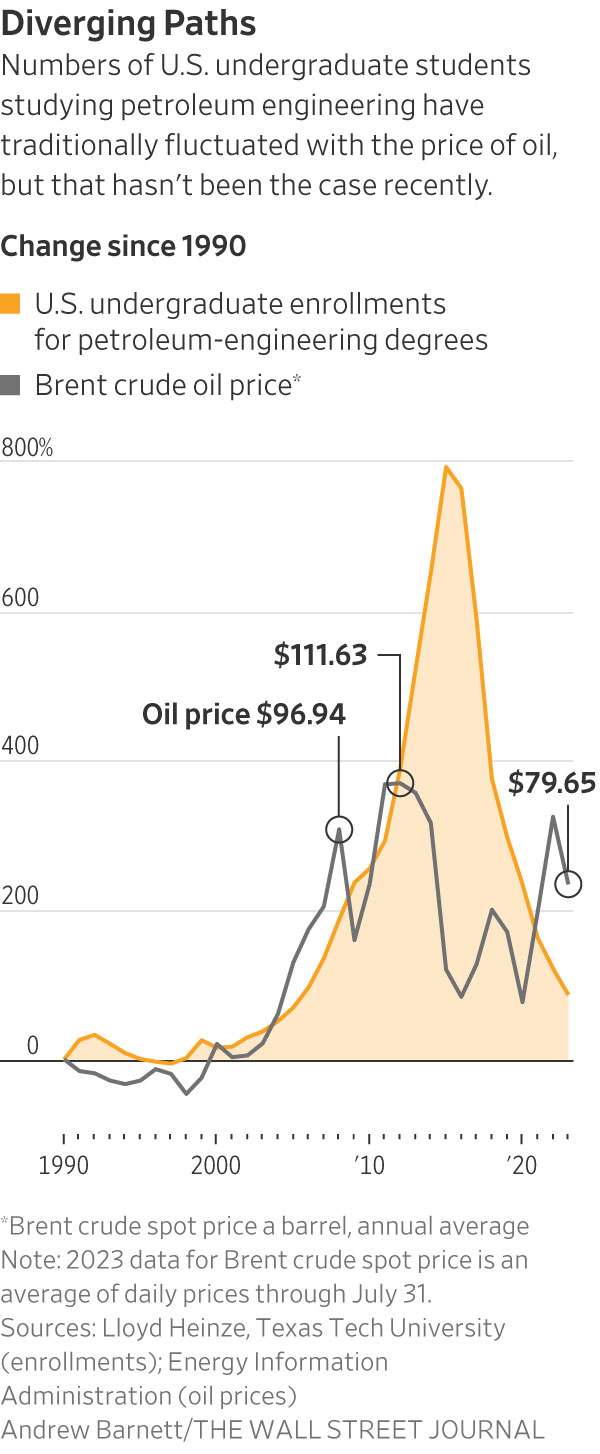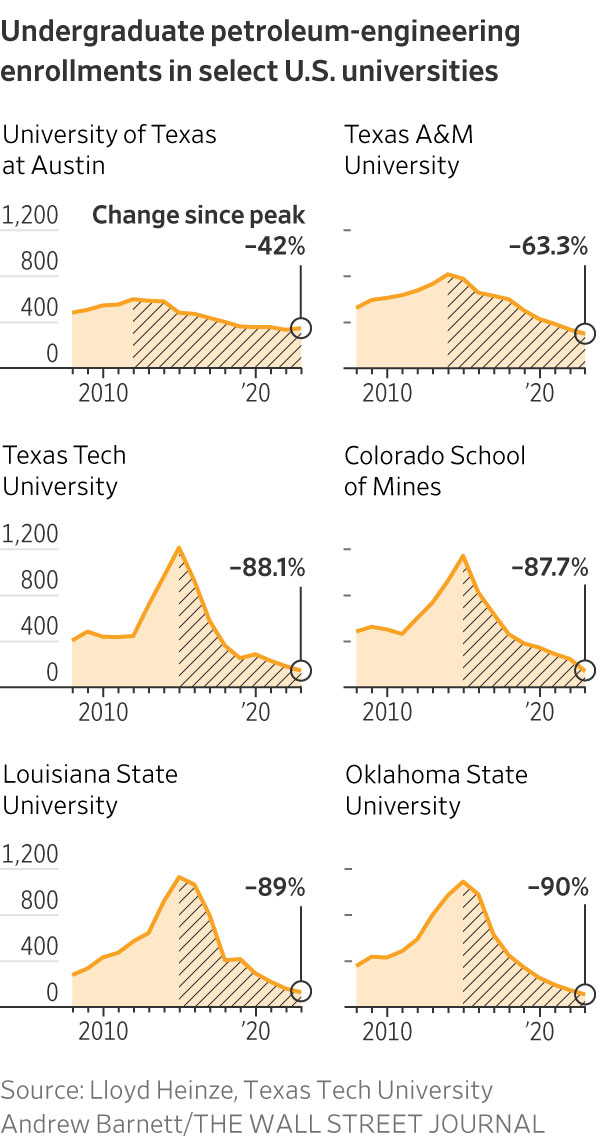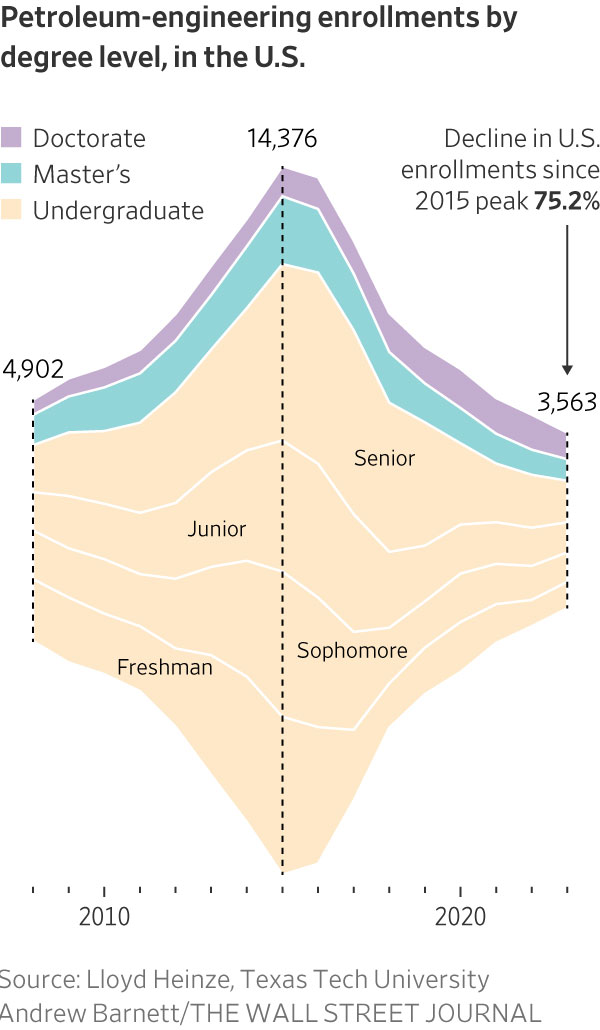Big Oil’s Talent Crisis: High Salaries Are No Longer Enough
Energy companies scramble to attract engineers as young workers fret over climate and job security
Good news from the oil patch: Jobs are plentiful and salaries are soaring.
The bad news is that young people still aren’t interested.
Even as oil-and-gas companies post record profits, the industry is facing a worsening talent drought.
At U.S. colleges, the pool of new entrants for petroleum-engineering programs has shrunk to its smallest size since before the fracking boom began more than a decade ago. European universities, which have historically provided many of the engineers for companies with operations across the Middle East and Asia, are seeing similar trends.

Students and high-skilled young workers are concerned about the industry’s role in climate change, as well as long-term job security given that global economies are transitioning away from fossil fuels to other energy sources, according to executives, analysts and professors.
The trend is a stark departure from previous cycles, when the industry’s workforce ebbed and flowed with the rise and fall of oil prices.
Between 2016 and 2021—a period when the Brent crude price nearly doubled—the number of petroleum-engineering graduates more than halved, according to the U.S. Department of Education.
The number of undergraduates pursuing petroleum engineering has dropped 75% since 2014, according to Lloyd Heinze, a Texas Tech University professor.
It is a trend that has continued even as other recent studies have shown that the average graduate earns 40% more than a peer with a computer science degree.
That puts students, including Hayden Gregg, in high demand.
The 21-year-old Kansas City, Mo., native is studying petroleum engineering at Colorado School of Mines. His graduating class of 36 students is down from around 200 in the years before oil prices collapsed in the mid-2010s, according to a college official.

“People are concerned they won’t have a job in 10 to 20 years,” said Gregg.
Encouraged by his roommates and a visit to the oil-and-gas heartland of Texas, he became convinced that the industry offers a range of engineering possibilities as it transitions to a broader mix of energy sources.
“Even if oil and gas is going away, I can deploy my skills in other engineering fields,” he said.
Jennifer Miskimins, head of the petroleum engineering department at Colorado School of Mines, said Gregg’s graduating class is benefiting from a pickup in oil-industry hiring and many have gotten good internships. “They’re a hot commodity,” she said. “I think this class is going to be sitting pretty.”
Oil-and-gas companies are pouring money into fellowships and other programs designed to cultivate a new generation of talent. Much of the focus is on white-collar careers that tend to attract college graduates, but the trend is broadly true among the industry’s blue-collar workers as well.
A big part of the pitch is that the industry is increasingly dynamic and creative, requiring employees who can run carbon capture, hydrogen and geothermal projects, said Barbara Burger, who served in several leadership roles at Chevron and is now a senior adviser at investment bank Lazard.
Part of the challenge, she said, is that there are more startups and fast-growing companies in those fields that don’t carry the same baggage as the giants that earn most of their profits from fossil fuels.

“There’s competition in a way that probably wasn’t there 15 years ago,” she said.
Burger recently attended an event hosted by Fervo Energy, a startup that uses the shale boom’s horizontal drilling and fracking techniques to develop geothermal wells for electricity generation. Around 60% of Fervo’s employees previously worked at oil-and-gas outfits, the company said.
To attract workers, she said, oil-and-gas companies need to better articulate their energy transition strategies, including efforts to carve out new businesses or curb emissions.
“That’s a hook for employees—current and future,” Burger said. “They want to know there’s a future in the actual companies, the industries and the skill sets they have.”
The talent shortage represents a long-term problem at a moment when energy security—largely dependent on fossil fuels for the foreseeable future—is increasingly a global priority. Since Russia’s invasion of Ukraine last year, Europe has become desperate for new supplies of oil and gas, though countries around the world are trying to keep fuel affordable.
Darian Kane-Stolz said that growing up in New York, she was always concerned with climate change. She taught neighbours how to recycle.
When Kane-Stolz, 25, enrolled at the University of Texas at Austin seven years ago, she felt that joining the petroleum-engineering program was consistent with her desire to have a positive impact on the planet.
Now a BP engineer bringing wells online in the Gulf of Mexico, she said the attitude toward the industry has drastically shifted within her cohort. Before she goes out with friends, she sometimes prepares talking points in case someone attacks the industry.
“There’s definitely a negative perception out there,” said Kane-Stolz.
BP this year launched a new $4 million fellowship program with U.S. universities to provide students with exposure to the energy industry. It also said last year that it planned to double the size of its apprenticeship program to 2,000 people this decade.
“To achieve our goal of reimagining energy, we need the brightest talent,” said a BP spokesperson.
Meanwhile, Kane-Stolz’s alma mater, the University of Texas, is working on adding a new master’s degree without the word “petroleum” to capture a broader group of students who still want to work in energy-related engineering, said Jon E. Olson, the department chair of petroleum and geoscience at UT.
Other universities are ending their petroleum engineering degrees or rebranding them. Imperial College London—formerly housing the Royal School of Mines—shut its program last year and replaced it with one in geo-energy with machine learning and data science.
Analysts and company officials say a steady flow of talent is critical to company efforts to build out infrastructure needed to curb emissions and develop clean-energy and low-carbon businesses.
“One of the scarcest resources at the moment seems to be people,” said Aslak Hellestø, a business adviser for Northern Lights, a carbon capture and storage project off the coast of Norway operated by European energy companies Equinor, Shell and TotalEnergies.
“This is groundbreaking technology and we cannot afford to try and fail,” he said. “We need young people with new ideas and bright minds to make it right the first time.”
 Copyright 2020, Dow Jones & Company, Inc. All Rights Reserved Worldwide. LEARN MORE
Copyright 2020, Dow Jones & Company, Inc. All Rights Reserved Worldwide. LEARN MORE
Chris Dixon, a partner who led the charge, says he has a ‘very long-term horizon’
Americans now think they need at least $1.25 million for retirement, a 20% increase from a year ago, according to a survey by Northwestern Mutual
The G80 Sport makes its entrance, displaying dynamic design details and elevated automative capabilities.
Juma Al Majid LLC, the exclusive dealer for Genesis in the UAE, has launched the G80 – a cutting-edge luxury sedan. Merging tradition with innovation, this model embodies Genesis‘ relentless pursuit of superior design, state-of-the-art technology, and unmatched luxury.
The new G80 marks a significant milestone in introducing Korean automotive excellence to the UAE, highlighting the brand’s commitment to providing exceptional experiences.
Meticulously crafted, the redesigned G80 adheres to the ‘Athletic Elegance’ design philosophy synonymous with Genesis. This luxury vehicle features refined details and cutting-edge specifications, combining comfort and style to elevate every driving experience to new heights.
“The debut of the all-new G80 in the UAE market propels our vision to converge advanced technology and refined elegance”, stated Suliman Al Zaben, Director of Genesis, UAE. “This launch is a step forward for Genesis in the UAE market and strengthens our efforts to offer ultimate luxury, innovation, and unique design to our incisive customer base.”
With a new dual-mesh design, the G80’s exterior enhances the sophisticated appearance of the Two-Line Crest Grille, paired with iconic Two-Line headlamps featuring Micro Lens Array (MLA) technology. This highlights Genesis’ commitment to harmonizing advanced technology with elegant design. The five 20-inch double-spoke wheels exude a dynamic aesthetic, resembling sleek aircraft lines, complementing the car’s parabolic side profile. Rear diffusers conceal mufflers adorned with distinctive V-shaped chrome trim inspired by the Crest Grille, embodying an eco-conscious ethos in today’s technology-driven era.

The G80 reinforces Genesis’ design philosophy in its interiors, inspired by the uniquely Korean concept of the Beauty of White Space, integrated with state-of-the-art technology to create cosmetic brilliance for users. The 27-inch-wide OLED display seamlessly combines the cluster and AVN (Audio, Video, Navigation) screen in a horizontal layout, extending to the center fascia, showcasing its flair for innovative technology. The touch-based HVAC (Heating, Ventilation, and Air Conditioning) system offers ease of control, while the redesigned crystal-like Shift By Wire (SBW) ensures a comfortable grip, infusing a sense of luxurious convenience.
With its dual-layered Crest Grille and expanded air intakes, the G80 Sport package delivers a dynamic and sporty spirit. Exclusive interior options, such as a D-cut steering wheel and carbon accents, enhance its sporty allure. Equipped with Rear Wheel Steering (RWS) and Electronic Limited Slip Differential (E-LSD), the G80 Sport 3.5 twin turbo model is built for stable control during high-speed maneuvers.
Fitted with advanced safety and convenience features, this luxury sedan includes Remote Smart Parking Assist 2, Lane Following Assist 2, and a Fingerprint Authentication System. The three-zone HVAC system provides customized climate control for all passengers. With two powertrain options – a 2.5 turbo engine delivering 300 horsepower and 43.0 kgf·m of torque, and a 3.5 twin turbo engine producing 375 horsepower and 54.0 kgf·m of torque – superior driving dynamics ensure a silent and luxurious driving experience.

Chris Dixon, a partner who led the charge, says he has a ‘very long-term horizon’
Americans now think they need at least $1.25 million for retirement, a 20% increase from a year ago, according to a survey by Northwestern Mutual





















